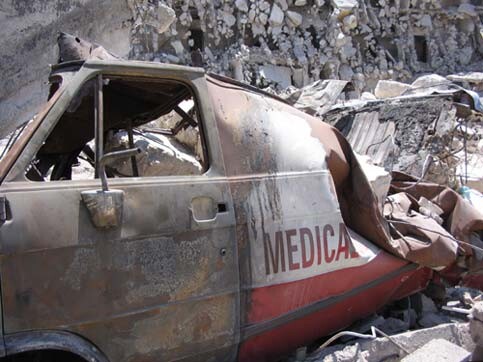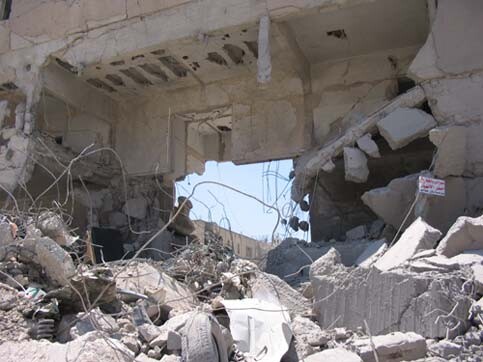Nablus 3 August 2006

An ambulance destroyed after being attacked by Israeli occupation forces in Nablus. (Jenny Digi)
It’s taken me a while to get used to being back in Nablus and my sleep on the first few nights was broken regularly by bangs, explosions and the 4 AM call to prayer. Lying in bed on the first night, I moved my mattress away from the window, feeling too exposed to the soldiers who have a large base at the top of the hill. In 2003 there was safety in my nationality to some degree - the Israeli soldiers were not so likely to randomly shoot internationals. Now, this feeling of protection doesn’t feel quite so strong in the light of what the Israeli military have been doing in Lebanon, indiscriminately killing anyone regardless of nationality, status (civilian or combatant) and age. My dreams were full of tanks and soldiers, only to be expected really as the city itself has plenty of these around in the night when they spread out from their daily haunts (either the bases and checkpoints surrounding Nablus) and caging the population in a modern ghetto or harassing civilians in the camps or Old City. Like a deadly disease seeping along the highways they spread anger, hopelessness and fear. The fear that I felt is just a taste of what the people of Nablus are living with every day, even when the soldiers are not in the city itself. Nablus is nestled in a valley between two mountains, and there are Israeli military bases on the top of the mountains, practically invisible during the day, their presence is felt at night by the glinting of red lights marking their towers and fences, and by the intermittent gunfire as snipers pass their time aiming at random targets from bins, streetlights and windows, to people on the streets or in their homes.
One evening while we waited on the street corner for a taxi to get us back to our apartment, after cutting our business meeting short due to the increasing military activity in the area (gunfire doesn’t matter so much, but when we heard the Israeli soldiers had brought cannons in we decided it would be safer to head back then). An SUV drove past with about 10 shebab (“youth”) hanging off the side driving through the city to where the Israeli soldiers were. A young Palestinian woman voiced her dislike for the deliberate antagonism of youths to go and confront the military, throwing stones and sometimes Molotov cocktails at tanks. She feels that by doing this all it does is increase the tension and provides an excuse for the soldiers to use their weapons. Such activities generally end up with wounded, or even dying, shebab on the streets, adding to the rising death toll, and the anger of the people, part of the endless cycle in this place of violence and retribution.

The Muqata, a local government building, in Nablus, after it is attacked and destroyed by Israeli occupation forces. (Jenny Digi)
An interesting point that I’ve heard from two Palestinians since I arrived here already is regarding the activities of people trying to resist the occupation. In response to the destruction of the Muqata last week, the people of Nablus called a general strike, closing their shops and staying home. When the point of this was questioned by one of the internationals (as it appears to have little effect on the Israelis), these two replied that it is only done because there is a history of taking that action. The resistance is, in a way, stuck in its ways.
Today (Sunday) the city is shut down again in mourning over the assassination of two wanted men in the Old City last night. These assassinations are completely illegal under international law.
Life can feel deceptively normal here on some level; getting up in the morning, eating breakfast, walking to work or taking a taxi (and getting stuck in the endless queues of commuters traveling through the city to work, to university, to the market), sitting in front of a computer in the office typing away at reports and funding proposals, walking home in the evening going via the market then getting home and taking a shower before going back in to town for a party or to meet up with friends. However, while within Nablus these things are all possible, every single one of them is impacted upon by the occupation.
Take, for example, Saturday night when I was walking through the city from the flat to a hotel next to the Old City where the brother of a friend was having a birthday party. It is a beautiful walk, especially at that time of night as the sun is setting over the city; reflections in the thousands of windows multiply the golden orb to infinity and turn the white bricks of the houses a stunning pink and gold. It is a quiet time, the mad bustle from the day has ended and most people are in their homes, many of them eating their only full meal of the day as at least 60% of the population in Palestine lives beneath the poverty line. Suddenly, the peace of the evening is disturbed, near the Old City in the centre of Nablus there are loud explosions and Israeli gunfire (it’s disturbing how quickly you can tell the difference between the different weapons and whether they are being used in anger or celebration). Walking in the dark through the quiet streets which only moments before felt welcoming is no longer comfortable, knowing the Israeli soldiers are about the friendly groups of men chatting on the corners are replaced by anxious huddles of shebab, waiting to see where the soldiers will go to next.
At the hotel we still have a pleasant drink; this is normal life here. The hotel run by an amazingly diligent and dedicated man who is trying to keep the place going despite there not having been any real tourism for 6 years. He’d been managing to exist on trade from the various NGOs in the city until the election of Hamas, but now so many of them have pulled out of the area, or had their funding stopped, that he is struggling to pay the wages of his staff every month. There is a lot of anger and confusion over the reaction of the international community to the elections. The way that people here see it is that they tried to be democratic, they had elections (that international observers witnessed and were happy with) and then the reaction from others is that they withdraw money because they don’t like a choice. To the Palestinians this is like saying, okay, you can have democracy, but only if you elect the people we want you to elect. What form of democracy is this?
The party finishes as the young men go off to pray and we wait for a lift home watching the tiny slice of the moon slip behind the roof. After the mosque PA system has sounded the call the prayer one of the militant groups takes over and shouts unintelligibly, disturbing the night once again, and on the way home the tension on the streets is almost visible. Throughout the night the PA system alternates between the call for prayer and the militants, one a pleasant musical addition to dreams, the other eliciting uneasiness and distress.
Flights from the US carrying weapons to Israel to be used to bomb civilians in Lebanon are traveling through Prestwick Airport in Scotland. This is a chance for you to do something to stop this madness. Stop those planes, protest at the airport…I hear the bombs being flown across this city, knowing the destruction that they are going to do, but from here in my room, I can’t reach them.
Jenny Digi is a peace activist from Scotland. She first visited Nablus in April 2002 during Operation “Defensive Shield”, experiencing first hand the illegal acts of the Israeli military against medical personal. She now volunteers with Project Hope, providing education and recreation services in Nablus, Balata and Askar. She is in Palestine with Project Hope and making a film about life under occupation. She maintains a blog at http://jaidigi.livejournal.com/.
Related Links

